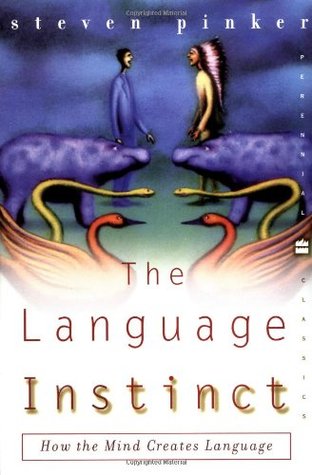 The Language Instinct, Steven Pinker
The Language Instinct, Steven Pinker
When it comes to something I don’t know much about, I’m pretty easily swayed by other people’s arguments. Like, I finished this book feeling it was pretty intelligent and interesting, and then I read some criticisms and reviews and heck, I don’t know what to think. Still, I did find it interesting, and while the book looks deceptively slim for how long it took me to get through it, Pinker expresses his arguments clearly, with examples and sourcing, etc.
His basic argument is that we’re hardwired for language. That, as with our sight, hearing, etc, we have a ‘language sense’; if properly stimulated during the critical period, our brains quickly figure out how to parse language (at least, the language spoken around us when we are at that age, even if that language is sign language). We don’t need to hear every word or possible sentence structure (couldn’t possibly) to pick up on the rules of grammar and apply them, when speaking and when listening. This only refers to the critical period; a child will learn grammar instinctively on being exposed to a language, but an adult must learn it by rote, in the same way as you have to learn to process visual input during the critical period for that, or you’ll never have the same visual acuity as someone who did.
Thus far, I think I’m going along with him. I do have questions of a sort of chicken and the egg nature: which came first, the brain’s Universal Grammar module, or language that necessitated it? I’m inclined to think that the structures that we now use to understand language were used for something else earlier in our evolution, and became co-opted into our communications array (so to speak) over time. Our brains formed language, and then the language formed our brains…
All in all, I don’t know whether Pinker’s right, but I found his work convincing. Having read a couple of other books on language, including Guy Deutscher’s Through the Language Glass, and applying what I know from those too, I find it hard to disagree with Pinker even where I want to, for example about relativism.
Rating: 4/5

I’ll have to read this again sometime — I had the same feelings as you about it until I read it wasn’t received well universally. Good points.
I always find people who write intelligently like Pinker so hard to disagree with!
People like Pinker seem to manage the big concepts as well as they do the detail, and I quite like the stimulation those concepts provide if they’re well thought through and clearly presented.
I would also check out the argument E. O. Wilson makes for the language in his book The Social Conquest of Earth, although it is difficult to describe briefly. I think his view is that it can be categorized as “prepared learning,” something between instinct and culture.
Ooh, thank you. “Prepared learning” makes sense, and I don’t think Pinker would really disagree with that? He’s not saying we’re born able to speak a language, he’s saying we’re born able to learn.
I think it is very similar, although the author I mentioned seemed to make a small distinction, I don’t remember what it was though. Did you like any other books by Pinker? I have been meaning to read his most recent one.
Interesting, I’ll check up in the library if they’ve got the book you mentioned.
Re: Pinker, not yet, though I have got The Blank Slate on my Kobo and The Better Angels of Our Nature from the library.
Yes, The Blank Slate is also interesting. And Better Angels is the one I have to read. It looks like it’s his longest book so I’ve been waiting awhile to get around to it…